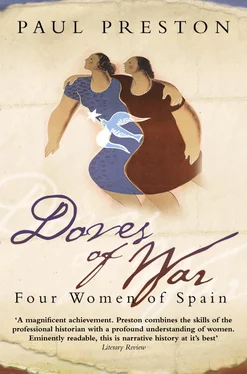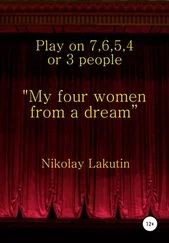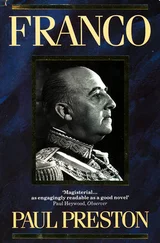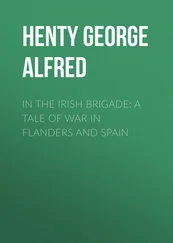Occasional visits from Ataúlfo merely left Pip – and indeed his mother – feeling tense. Not being involved in their frenetic relief work, he moped around the house and picked quarrels with Princess Bea who would take out on Pip her consequent distress. Pip wrote in her diary: ‘Life is so hopeless anyhow. I almost wish Ataúlfo had not come at all. I am just about at the last gasp as it is. I don’t want to see Ataúlfo. I want to be left in peace with no more work and no more emotions.’ In early May, Pip was awarded her military cross for her bravery at Escatrón. She also served drinks at the Barajas aerodrome when Franco came to preside at a fly-past of the Nationalist air force, including Germans and Italians. She was not impressed by the Caudillo: ‘Franco is a weeny little man, the size and shape of a tennis ball and looked too funny beside huge stooping lanky old Kindelán and even taller, lankier Queipo de Llano.’ In fact, the round of victory parades and march-pasts, of celebratory dinners and cocktail parties, heralded the inexorable approach of Pip’s return home. At a dinner at the Ritz, she sat disconsolately watching others dance, longing for Ataúlfo and reflecting ‘it is going to be one hell of an effort to get used to enjoying dancing with anyone else again’. After a visit to Philip II’s palace at the Escorial on Sunday 14 May, she wrote: ‘Everyday I love Spain more and hate more having to leave it. I will visit it again but it will never be my country like now.’ On the following day, she was even more down. Ataúlfo was going to Germany with the Condor Legion. She was anything but resigned as she wrote:
I can’t bear the thought that this is all over. I can never be of the family here again. I will stay with them and them with us but it won’t ever be the same. God knows how, when and where Ataúlfo and I will meet again once I leave Spain. And I must go. How I hate life for doing this to me. I want to be married and have lots of children and lots of fun. And I can’t do it and can’t even be happy. 123
On 17 May, Pip was exhilarated when Prince Ali took her flying in a Savoia Marchetti 79 bomber and let her take over the controls for ten minutes. On the same day she had dinner with Peter Kemp, who introduced her to Major Hugh Pollard. Pollard was a retired army officer, secret-service agent and sexual adventurer. He had helped make the arrangements for the Dragon Rapide that flew from Croydon on 11 July 1936 to collect Franco in the Canary Islands and take him to Morocco to join the military uprising. 124 He lived up to his image by making indecent advances to Pip. Kemp was rather more romantic and declared his love for her. This provided her with an opportunity to make Ataúlfo jealous although it backfired, souring things between them. Her last days in Madrid were beginning to resemble her life in London before she came to Spain – a wild round of cocktail parties, dinners and her ongoing flirtation with Peter Kemp. That ended when she was outraged by his persistent attempts to prise bits of military information out of her friends in order to pass it on to the British military attaché. When she said farewell to Ataúlfo on the eve of his departure for Germany, they spoke of their next meeting. Pip said that it would be in the air in the next war and he replied that he would shoot her down. ‘And so endeth both the happiest, unhappiest and most eventful chapter in my life up to date.’ 125
Frentes y Hospitales was dissolved in late May and there was nothing left for Pip to do. On Monday 5 June, she took ship for England and was back in Seaford House four days later on Friday. One of her first tasks was to report on the situation in Spain to the exiled Queen Victoria Eugenia, Princess Bea’s cousin. Reflecting the patrician prejudices of the Orléanses, she told her ‘how Red the Falange is and that Serrano Suñer is ambitious, self-seeking and not to be trusted’. She busied herself but felt desperately lonely. She wrote of the contrast between her armies of friends and the fact that ‘inside of me there is nothing more than just a lonely emptiness’. It was all to do with Ataúlfo and now there was no war or relief work to distract her. ‘I wish to God I could get him out of my head for five minutes of the day. If I buy clothes it is because he might see them, if I hear jazz I want to be dancing with him; if I hear a joke I want to tell it him; if I see something nice I wish he was there to see it too.’ 126
Certainly, after her experiences both in the war and in the Orléans household, life in London would never be the same again. There could be no going back. Pip felt completely lost. Gaenor, her sister, compared it to those who returned from France after the First World War. Many years later, Pip’s son concluded from conversations with her that she had been burned out. It was certainly not uncommon for those who had been in Spain to find their contemporaries incapable of understanding what had happened there during the Civil War. Even her sister, with whom she had been very close, now seemed a stranger, having grown up and married. After the rigours of Spain, Pip busied herself with the usual distractions – the races, cocktail parties, dances, and pampered herself with visits to hairdressers, dressmakers and shopping. For all that it was infinitely more pleasant than life in a front-line hospital, she found it meaningless. On 19 June, she met the great theatrical stars, Flora Robson and John Gielgud. She acquired a new car but her thoughts were really set on a possible visit from Ataúlfo.
She worked on censoring her diary for publication. Pip was persuaded that it was publishable and she set about editing it. Her blue pencil seemed to have had two principal concerns. She was anxious to ensure that nothing said about Prince Ali, Princess Bea or the rest of the Orléans-Borbón family could embarrass them. On the eve of war, she also eliminated references to the Luftwaffe pilots she had known through Ataúlfo and to her distress at the prospect of going to war against people she considered to be her friends. The outbreak of the Second World War led to the prospective publishers pulling back. Thereafter, she said that she could not bear to look at the diary. It was her edited text that was published in 1995. 127
Ataúlfo arrived in London at the beginning of July, ‘looking very handsome and sunburned and healthy’. However, since his German comrades had been asking him why he had not married Pip, he had become careful not to spend too much time with her lest ‘people should start talking here too’. Pip realised once more that he had no intention of marrying her: ‘Firstly, he is not in love with me, secondly he has no money so can’t marry anyone, thirdly he has promised P. Bea only to marry a Princess.’ With the brilliant sophistry of the self-deceiver, she consoled herself that ‘if he was sure he really did not want to, he would not have to make his mind up about it so often’. In fact, they had such a good time together that she was emboldened to raise the subject of their future. She was devastated again when he told her what she already knew – that he didn’t love her and would not marry her. She thought of travelling to get him out of her mind. Bizarrely, on 19 July, she drove to Sanlúcar with Consuelo. 128
In fact, the warmth of her friendship with Ataúlfo was undiminished. They were together in Sanlúcar when the Danzig crisis broke. She mistakenly believed that the Nazi-Soviet pact made war less likely. Things went well enough until Ataúlfo had to leave for Yugoslavia on 30 August. On the following day, Germany declared war on Poland. Taking her cue from Prince Ali, Pip was inclined to blame Poland for the entire crisis. When war was declared on Germany, she felt she had to return to Britain. She was distraught at the prospect of another war. ‘I am sick to death of hospitals, of uniforms, of corpses, of everything to do with it. I loathe it all.’ She bravely set off to drive across Spain and a now belligerent France, reaching London on 9 September. The family home at Seaford House had become the Red Cross headquarters. 129
Читать дальше












